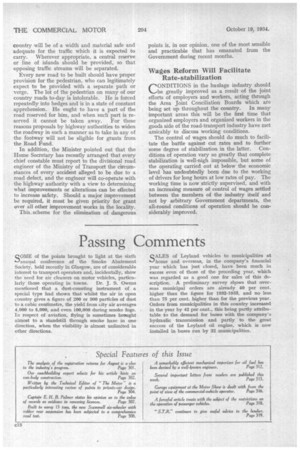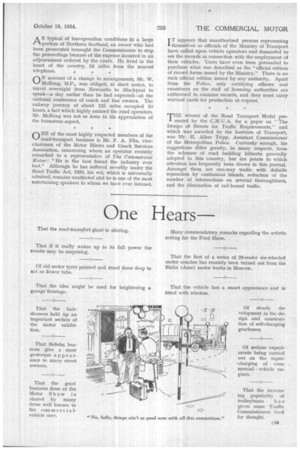Passing Comments
Page 40

Page 41

If you've noticed an error in this article please click here to report it so we can fix it.
SONIE of the points brought to light at the sixth annual conference of the Smoke Abatement Society, held recently in Glasgow, are of considerable interest to transport operators and, incidentally, show the need for air cleaners on motor vehicles, particularly those operating in towns. Dr. J. S. Owens mentioned that a dust-counting instrument of a special type had shown that whilst the air in open country gives a figure of 200 or 300 particles of dust to a cubic centimetre, the yield from city air averages 4,000 to 5,000, and even 100,000 during smoke fogs. In respect of aviation, flying is sometimes brought almost to a standstill through smoke haze in one direction, when the visibility is almost unlimited in other directions. SALES of Leyland vehicles to municipalities at 6-/home and overseas, in the company's financial year which has just closed, have been much in excess even of those of the preceding year, which was regarded as a good one for sales of this description. A preliminary survey shows that overseas municipal orders are already 40 per cent. higher than the figure for 1932-1933, and no less than 75 per cent. higher than for the previous year. Orders from municipalities in this country increased in the year by 42 per cent., this being partly attributable to the demand for buses with the company's hydraulic transmission and partly to the great success of the Leyland oil engine, which is now installed in buses rim by 32 municipalities. Astypical of bus-operation conditions in a large portion of Northern Scotland, an owner who had been prosecuted besought the Commissioners to stop the proceedings because of the expense incurred in an adjournment ordered by the court. He lived in the heart of the country, 24 miles from the nearest telephone. (-IN account of a change in arrangements, Mr. W.
McKeag, M.P., was obliged, at short notice, to travel overnight from Newcastle to Blackpool to speak—a day earlier than he had expected—at the national conference of coach and bus owners. The railway journey of about 135 miles occupied 10 hours, a fact which highly amused the road operators. Mr. McKeag was not so keen in his appreciation of the humorous aspect.
ONE of the most highly respected members of the road-transport business is Mr. F. A. Min, vicechairman of the Motor Hirers and Coach Services Association, concerning whom an operator recently remarked to a representative of The Cornmereied Motor: "He is flue best friend the industry ever had." Although he has suffered sevefely under the Road Traffic Act, 1930, his wit, which is universally admired, remains unaffected alid he is one of the most entertaining speakers to whom we have ever listened. IT appears that unauthorized persons representing themselves as officials of the Ministry of Transport have called upon vehicle operators and demanded to see the records in connection with the employment of their vehicles. Users have even been persuaded to purchase what was described as the "official edition of record forms issued by the Ministry." There is no such official edition issued by any authority. Apart from the Police, only certifying officers and examiners on the staff of licensing authorities are authorized to examine records, and they must carry warrant cards for production at request, THE winner of the Road Transport Medal presented by the C.M.U.A. for a paper on "The Design of Streets for Traffic Requirements," and which was awarded by the Institute of Transport, was Mr. H. Alker Tripp, Assistant Commissioner of the Metropolitan Police. Curiously enough, his suggestions differ greatly, in many respects, from the schemes of road building hitherto generally adopted in this country, but are points to which attention has frequently been drawn in this journal. Amongst them are one-way traffic with definife separation by continuous islands, reduction of the number of intersections on arterial thoroughfares, and the elimination of rail-bound traffic.












































































































